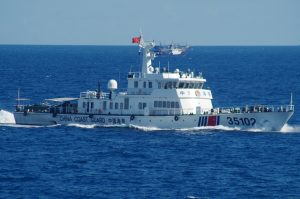The 25th session of the Standing Committee of China’s 13th National People’s Congress (NPC) held in January introduced the Coast Guard Law, which took effect on February 1. The new provoked strong reactions from China’s neighbors, including the Philippines, Vietnam and Japan.
On February 4, at the 12th Round Meeting of the Japan-China High-Level Consultation on Maritime Affairs, the Japanese government conveyed “strong concerns” over the law, calling for it to be implemented in line with international law. Many countries permit the use of weapons against foreign vessels that ignore the warnings of coast guards and enter their territorial waters, so whether the problem lies in the fact that the Chinese Coast Guard Law is an immediate violation of international law or that the law permits the use of weapons is open to question. Regardless, the sensitivities of neighboring countries that take issue with this law can be attributed to two factors.
First, the definition of “jurisdictional waters,” which sets the scope of application of this law, is problematic. The law grants the authority to manage and control foreign vessels in the jurisdictional waters and facilities on islands within those waters. The use of weapons to execute that authority is also permitted under certain conditions. Yet the law does not provide a definition of jurisdictional waters. The draft of the law defined it as internal waters, territorial sea, contiguous zones, exclusive economic zone (EEZ), and continental shelves. However, this definition was deleted and no alternative definition has been provided. If the definition contained in the draft is applied, it is feared that the China Coast Guard (CCG) will take a firm stance against foreign vessels in many areas of the East and South China Seas based on its national laws. For example, the Chinese continental shelf in the East China Sea extends as far as the Nansei Islands of Okinawa Prefecture.
Second, there are numerous territorial disputes between China and its neighbors in the East and South China Seas. Countries that have territorial disputes with China worry that Beijing may interpret the law as extending to the internal waters of islands that China considers its territory, as well as contiguous zones and EEZs of these islands, meaning that it may manage and control those territories and zones. In the case of the South China Sea, for example, if buildings on islands that China considers its own territory are subject to management and control within its own territory, all sorts of problems will follow.
In the absence of specific actions, however, these are just groundless fears. For the time being, countries will be paying close attention to the scope and application of this law.
Consider the present situation in the East China Sea, around the Senkaku Islands, just over two weeks since the law came into effect. At a regular press conference on February 17, Admiral Takahiro Okushima, Director General of the Maritime Safety Agency (Japan Coast Guard, JCG) said that “the situation regarding the sea around the Senkaku Islands remains challenging and unpredictable” but that “thus far no significant change has been observed in the movement of CCG vessels in the area.” Two CCG vessels entered the territorial sea around the Senkaku Islands on February 6, followed by two more on February 7, two on February 15, and another two on February 16. At the same time, four ships sailed within the territorial sea. By February 17, the total number of vessels had already reached 10, surpassing the six vessels of the previous month and the eight vessels of February last year, showing that activity has in fact increased. In addition, a series of recent incidents has occurred in which CCG vessels have approached and pursued Japanese fishing vessels in the waters surrounding the Senkaku Islands.
In light of this, some observers have concluded that the CCG is gradually stepping up its activities, and concerns in this regard were raised by the Foreign Affairs Division of the Liberal Democratic Party on February 16. In a teleconference on February 18 between Japan’s National Security Council Secretariat Secretary General Shigeru Kitamura and Assistant to the President and National Security Advisor Jake Sullivan, the status of CCG’s activities following the enforcement of China’s Coast Guard Law was a topic of discussion. However, as Okushima remarked, the Japanese government does not consider there has been a fundamental change to the level of activity of the CCG since February.
China has claimed through its embassy in Japan and other outlets that the Coast Guard Law is not a violation of international law, and is seeking the understanding of the Japanese public. Whether or not the new law is a violation depends on interpretations of international law, specifically the United Nations Convention on the Law of the Sea (UNCLOS), but this will not be readily understood by the Japanese public. The biggest factor influencing public opinion will be the specific activities of the CCG.
Besides consulting with the U.S. and communicating its concerns to China directly, there are a number of measures Japan needs to take. The first is to discuss and share information with neighboring countries that share Japan’s concerns, and work together to communicate those concerns to China. The second is to consult and coordinate with China on the latter’s understanding of UNCLOS and international law, to clarify Beijing’s position. A third step would be to bolster the capabilities of the JCG, although the while keeping a close watch on the situation.
KAWASHIMA Shin is a professor at the University of Tokyo.

































